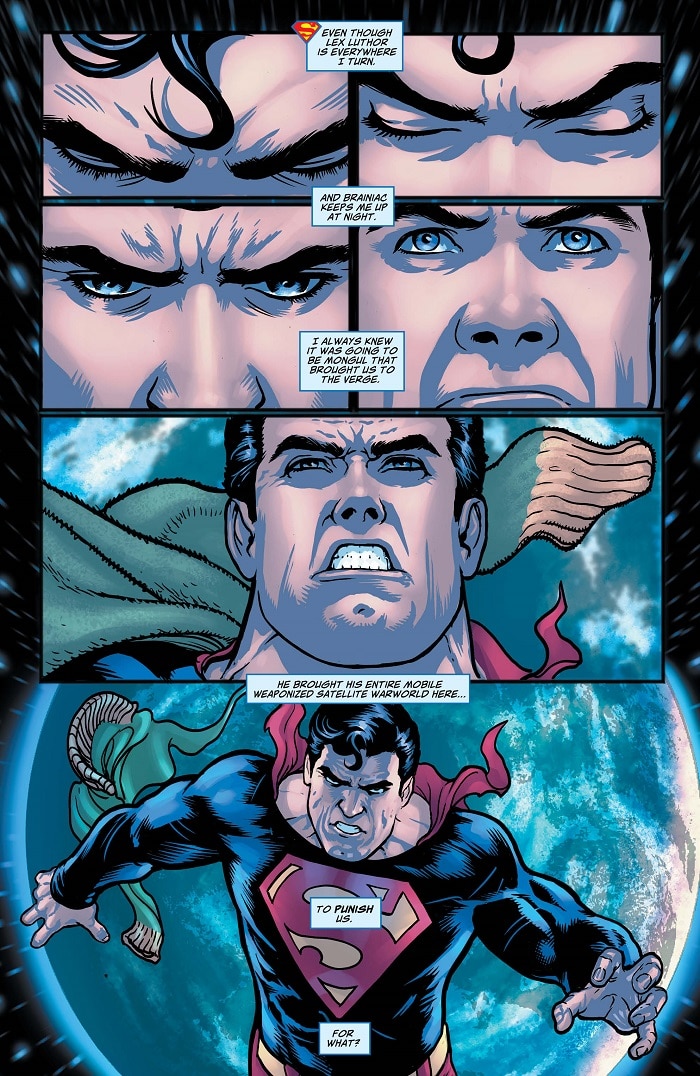The politics of superheroes have always fascinated me. Take the Justice League, for example. It sounds great in theory—I mean, who wouldn’t want a team of super-powered heroes looking out for the human race? But then, you take a step back and think about it for a moment and it starts to seem much less cut and dry. To avoid favoring any one nation, the Justice League works independently of all of them, but that leaves them unaccountable to anyone but themselves. And while we as comic readers know that they’re always putting human interests first, you can’t expect the people of Earth Prime to realize that. They don’t have the unfettered access to the Hall of Justice and the Watchtower that we do. From the everyday person’s point of view, the Justice League likely comes off as a team of godlike warriors capable of leveling entire cities that has decided Earth needs its protection, and NONE of the people of Earth had a say in the matter.
Sounds pretty authoritarian, if you ask me.
Of course, this is the argument that people like Lex Luthor have been making for years, and it’s why he’s such a great villain—his reasoning makes sense. And yet, he is the villain. We’re not supposed to agree with him. But if this were real life, how many of us would?

That’s why I find this stuff so fascinating. The truth is that the politics surrounding superheroes is complex. It’s not black and white. It often results in many of us siding with and cheering on behavior we likely wouldn’t approve of in real life.
Of course, the heroes realize this as well. I was reminded of that recently when reading Superman #22, the final issue in Brian Michael Bendis’s excellent “The Truth” storyline. As Kal-El battled Mongul outside the Earth’s atmosphere, Lois Lane found herself in a struggle of a different sort—but one that held no shortage of danger for her and her husband. After the news broke that Superman had chosen himself to represent Earth in the newly formed United Planets, FBI agent Cameron Chase visited Lois at her home to deliver a message for Superman: The United Nations was prepared to back his position as Earth’s United Planets representative and give him sanctioned authority within the body, but from here on out, there can be no more mistakes. That’s it. He’s reached the end of their rope.
It’s easy to see where the United Nations and Agent Chase are coming from. The world is still reeling from the revelation that Superman is really Clark Kent, a world-renowned reporter who was in part responsible for shaping the Daily Planet’s—and by extension, the world’s—narrative about the Man of Steel. Then right on the heels of that jaw-dropper, the Daily Star publishes a video revealing that Superman had secretly agreed to represent Earth in an organization that Earth didn’t even know existed until that very moment.


Again, as readers, we know how this all went down and that there wasn’t anything sinister about any of it, but the people of Clark’s world don’t know that. Rather, they just learned two very questionable things about a man with the power to bring the world to its knees. It’s enough to shake the faith of even the biggest Superman fan.
I think the fact that Lois, while obviously not pleased, doesn’t try to defend Clark’s actions shows that she understands this. Considering everything, and I’d imagine Lois understands this too, Superman’s probably lucky the repercussions weren’t any worse.
However, while Agent Chase’s message isn’t surprising, it’s also…well, largely toothless.
At the end of the issue, after Clark has won his battle against Mongul and returned home to Lois, he notices Agent Chase’s card on the kitchen table, and as he comes to bed, he has this pretty wonderful exchange with his wife.

So, what’s that about? One interpretation is that Lois has so little respect for Cameron Chase, the FBI and the UN that she doesn’t even bother conveying their message. However, I don’t think that’s what’s happening. Lois might not have been pleased with Chase, but again, remember, she didn’t try to defend her husband or his actions. She realizes Clark didn’t handle this right, and those missteps were bound to provoke a response from those in charge. But she realizes something else about the people in charge as well.
For all their bluster about how this is Superman’s last chance and that from here on out, there can be no more mistakes, they also 100% need him. He’s Superman, for crying out loud! People love him and he’s saved Metropolis and the world countless times. There’s not a person on this planet who doesn’t owe him their life, and he asks for nothing in exchange, other than that we try to live our lives a little better. Like all of us, Superman isn’t perfect, and on occasion, he’s going to make mistakes. But if he makes another big one, the people are going to forgive him for it because they know he’s a hero and that they’d be a lot worse off without him.
Lois understands all of this and knowing that her husband had just saved the world again, she decides not to pass the message on to him. The Man of Steel’s got a lot on his mind, from the fate of the world to the fate of his son. This message—which will almost certainly never be acted on—isn’t something he needs to stress over.
I may enjoy the politics of all this. But Superman? He has better things to worry about.
Tim Beedle covers movies, TV and comics for DCComics.com, writes our monthly Superman column, "Super Here For...", and is a regular contributor to the Couch Club, our weekly television column.




















